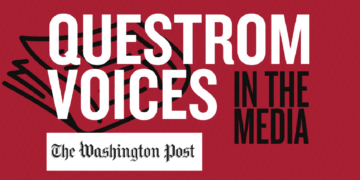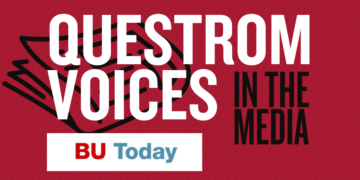What happens when economics meets business? Boston University’s new Business Economics PhD program – a collaboration between the Questrom School of Business and the College of Arts & Sciences Economics Department, prepares students to bridge theory and practice. Professors Keith Ericson and Tal Gross discuss how the program equips future scholars to explore how markets and firms work, tackle real-world economic challenges, and shape both policy and business decisions.
What’s the big idea behind the new Business Economics PhD Program at Boston University?
Prof. Ericson: Our business economics PhD program prepares students to create new knowledge about how markets and firms work, helping inform public policy and business decisions.
Prof. Gross: It’s a collaborative program between BU’s Questrom School of Business and the Economics Department in the College of Arts and Science.
What does it mean for the program to be based on a collaboration?
Gross: It means that students get the best of both schools: the opportunity to work with Questrom faculty members on important applied economics problems, and the opportunity to get a strong foundation in core economics fields from leading researchers in the Economics Department.
Ericson: It also means that PhD candidates get to be part of two cohorts of students. First, there’s the Questrom PhD students – students getting their PhD in another business field, such as Strategy, Finance, or Marketing. Second, there’s the Economics Department PhD students, working in various economics sub-fields, from development economics to macroeconomics.
Gross: In every PhD program, classmates are a critical resource. In this program, you get two great groups of classmates.
Tell us about the structure of the program.
Ericson: The foundation is just like the Economics PhD program. Questrom’s Business Econ PhDs take their core courses with the other Econ PhDs. Then, when it’s time for electives, the Business Econ PhDs take a mix of economics fields and electives at Questrom.
Gross: The Business Econ PhDs pick their own fields – it could be health, labor, IO, etc. – and concentrate in them. We expect a good mix across all these fields. Then you pick an advisor at Questrom and a committee member from the Economics department. So you get support from both departments.
Then what makes it a Business Economics PhD, as opposed to an Economics PhD?
Gross: That comes down to the types of research questions our students are interested in. We’re looking for students who want to tackle questions that are important to economists , and also relevant for firms. Business Econ PhDs would be prepared for academic positions in both the arts and sciences and in business schools, which really expands their options.
Ericson: Here’s a way to think about it. I’m a health economist. An important part of my research has been about how insurance companies respond to individual decisions – for instance, how firms take advantage of inattentive customers when setting prices for Medicare Part D’s prescription drug plans.
Gross: Though, to be clear, not every research question has to be laser focused on businesses. My own research often is a matter of studying how consumers respond to the market.
What else should students know about the Business Economics PhD?
Ericson: It’s fully funded, there’s lots of individual attention from faculty, and being a graduate student here gives you access to so many opportunities – across BU, as well as across the Boston area more generally.
Gross: We’re looking for students motivated to explore ideas and create new knowledge. The students who succeed are those who find joy in the process – writing, revising, discussing, discovering. It’s a long-term commitment, but also one of the most rewarding intellectual experiences you can have.
Learn more about the Business Economics PhD here.























